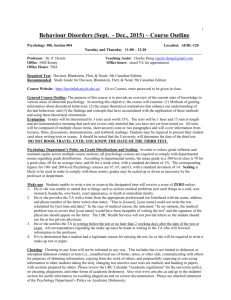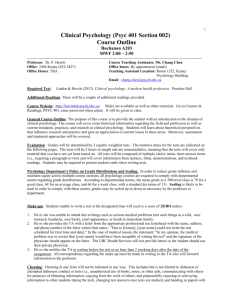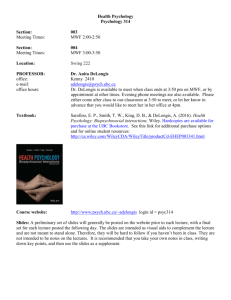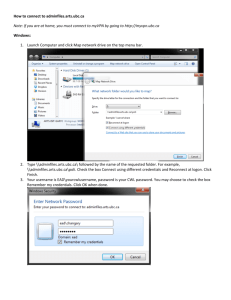PSYC-314: Health Psychology
advertisement
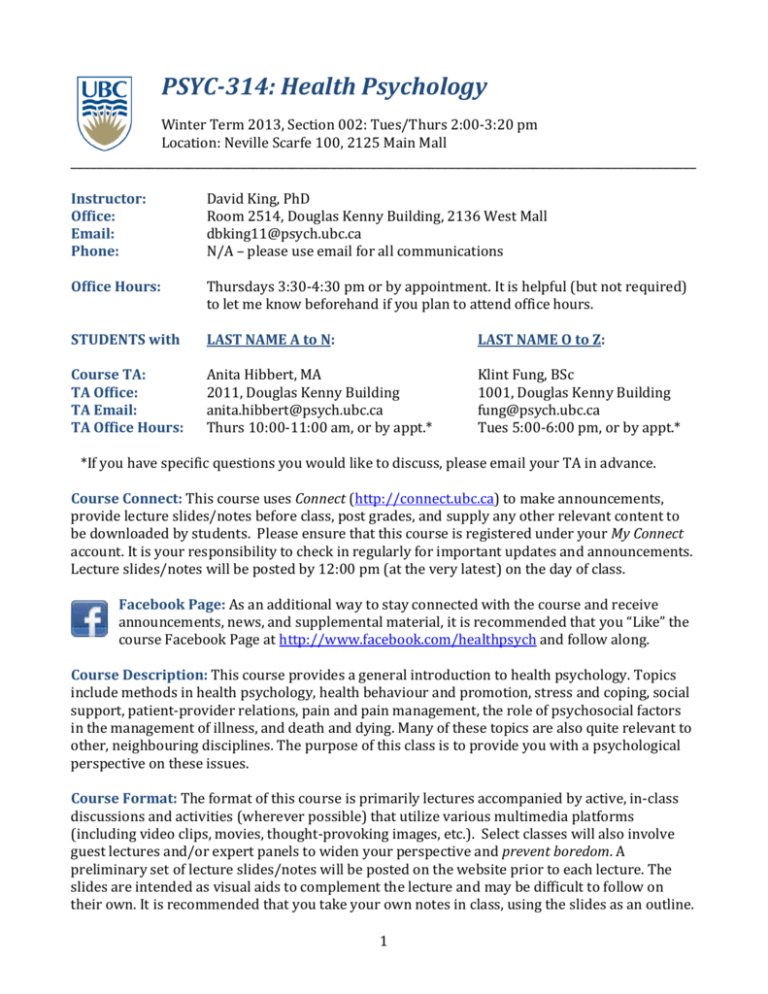
PSYC-314: Health Psychology Winter Term 2013, Section 002: Tues/Thurs 2:00-3:20 pm Location: Neville Scarfe 100, 2125 Main Mall ________________________________________________________________________________________________ Instructor: Office: Email: Phone: David King, PhD Room 2514, Douglas Kenny Building, 2136 West Mall dbking11@psych.ubc.ca N/A – please use email for all communications Office Hours: Thursdays 3:30-4:30 pm or by appointment. It is helpful (but not required) to let me know beforehand if you plan to attend office hours. STUDENTS with LAST NAME A to N: LAST NAME O to Z: Course TA: TA Office: TA Email: TA Office Hours: Anita Hibbert, MA 2011, Douglas Kenny Building anita.hibbert@psych.ubc.ca Thurs 10:00-11:00 am, or by appt.* Klint Fung, BSc 1001, Douglas Kenny Building fung@psych.ubc.ca Tues 5:00-6:00 pm, or by appt.* *If you have specific questions you would like to discuss, please email your TA in advance. Course Connect: This course uses Connect (http://connect.ubc.ca) to make announcements, provide lecture slides/notes before class, post grades, and supply any other relevant content to be downloaded by students. Please ensure that this course is registered under your My Connect account. It is your responsibility to check in regularly for important updates and announcements. Lecture slides/notes will be posted by 12:00 pm (at the very latest) on the day of class. Facebook Page: As an additional way to stay connected with the course and receive announcements, news, and supplemental material, it is recommended that you “Like” the course Facebook Page at http://www.facebook.com/healthpsych and follow along. Course Description: This course provides a general introduction to health psychology. Topics include methods in health psychology, health behaviour and promotion, stress and coping, social support, patient-provider relations, pain and pain management, the role of psychosocial factors in the management of illness, and death and dying. Many of these topics are also quite relevant to other, neighbouring disciplines. The purpose of this class is to provide you with a psychological perspective on these issues. Course Format: The format of this course is primarily lectures accompanied by active, in-class discussions and activities (wherever possible) that utilize various multimedia platforms (including video clips, movies, thought-provoking images, etc.). Select classes will also involve guest lectures and/or expert panels to widen your perspective and prevent boredom. A preliminary set of lecture slides/notes will be posted on the website prior to each lecture. The slides are intended as visual aids to complement the lecture and may be difficult to follow on their own. It is recommended that you take your own notes in class, using the slides as an outline. 1 Textbook: Health Psychology (2nd Canadian Edition) by Shelley Taylor and Fuschia Sirois (2011/2012). ISBN: 9780070319790. APA Reference: Taylor, S. E., & Sirois, F. M. (2012). Health Psychology (2nd Canadian ed.). Toronto, Ontario: McGraw-Hill Ryerson. Note about using older editions: It is not recommended that you use older editions of the textbook. Although much of the material is the same, you may be tested on information regarding more recent research findings in the field. These questions will likely not be addressed in older editions. Prerequisites: Health Psychology touches on issues that are of interest to students coming from many different disciplines. This also means that students have different backgrounds and skills. This course requires basic knowledge of psychological concepts and research methods. Although this course requires this knowledge, class time will not be spent in reviewing the required knowledge. Students who want a refresher are recommended to use the following resources. These books are on hold in the Koerner Library under Psych 314. Cozby, P. C. (2007). Methods in Behavioral Research. New York: McGraw-Hill. Myers, D. G. (2007). Psychology. New York: Worth Publishers. Course Evaluation: You will be required to write 3 exams (equally weighted, non-cumulative) and one written assignment (review paper), each comprising 25% of your final grade. Examinations. All three exams are weighted equally, and therefore each will be similar in length and scope (i.e., the final exam will not be particularly long or burdensome, despite having more time). Examinations are non-cumulative. Two midterm exams will be held during class time (1 hour and 20 minutes each in length) while the final exam will be scheduled by the university during the regular exam period. Two hours will be allotted for the final exam. The exams will consist of multiple choice and short answer questions. Please bring an HB pencil and an eraser to each exam to allow for electronic scoring of the multiple-choice questions. The exams will cover both lecture and textbook material. The purpose of the lecture is to amplify, explain, and expand upon the textbook material. Although there will be overlap between the lectures and the textbook, there will also be material that will be covered in the lectures that is not part of the textbook. Furthermore, some material from the textbook will not be discussed in class. This means that to be successful in this course you must carefully read the text and attend the lectures. Please note that during exams, invigilators may ask students to move or alter students’ seating arrangements with no explanation provided. An invigilator may ask you to move due to the possible misconduct of a classmate in an adjacent seat. Examinations will be given on published dates only. Exceptions will be made in the case of medical problems, in which case a doctor's note is required. Exceptions will also be made for students who have religious obligations that conflict with an exam date. If you are unable to write an exam due to medical problems, please contact me before the exam or within 24 hours after the exam. Students who do not contact me within 24 hours after the exam will be assigned a grade of “0” on the exam. If you are unable to write an exam due to religious obligations, please notify me 2 within the first 2 weeks of class. If you are required to write a makeup exam, you are expected to complete it within the shortest time period possible at the convenience of the TA. Moreover, the content and/or format of the makeup exam may differ from the original version. Exam grades will be posted on the course website as soon as they are available. Please allow 1-2 weeks for grades to be posted. Students wishing to view their exam should make an appointment with the TA. Students who have viewed their exam and who wish to have their exam re-graded should email me detailing in several sentences why they think that their exam was unjustly graded within 2 weeks of the grades being posted. Re-grades will not be considered after the 2week mark, although students are welcome to review their exams at any point in the term. Written Assignment. You are required to submit one written assignment (5-6 pages) during the course. This assignment is designed to help you think more critically about the topics we discuss in the course in an insightful way. The goal of the written assignment is to examine and review a particular area of interest within the field of health psychology and to make insightful conclusions regarding this topic. Your paper will be based on a newspaper or magazine article on a topic related to health psychology that appeared in print or online since January 2012. For example, a recent headline in an online news forum read, “Scientists demonstrate the connection between stress and cancer.” This would be a suitable topic. The newspaper or magazine article is to be used as a “jumping off” point for your paper and should only be discussed and referenced in the introduction and discussion sections. The body of your paper will then be used to review relevant research (minimum 5 articles) related to the topic in order to make clearer conclusions about the original article. Please email us to confirm your topic if you are unsure of its suitability. Topics must include both a health component and a psychosocial component or be directly applicable to health psychology to qualify. If you are unsure about your topic, please confirm it ahead of time with the TA. The paper should be organized as follows: Start with an overview of the topic discussed in the newspaper or magazine article. What is the specific aspect of the article that you will focus on in more detail? Provide a background to the topic and identify the goals and purpose of your paper (approx. 1page). Using the findings from at least 5 empirical, peer-reviewed articles, discuss the issue in more depth (these articles are in addition to the newspaper/magazine article). For example, you might choose 3 articles arguing one side of the topic and another 3 articles arguing a different perspective. Or, all articles may be on the same side, but offering slightly different points about the main topic (approx. 3-4 pages). Your conclusions on the topic should be based on the literature you reviewed and discussed, noting implications, common limitations in the field, areas of improvement, and suggestions for future research. In cases where topics involve controversy or debate, you should also make a firm conclusion regarding which “side” or perspective is the strongest based on the research you reviewed (approx. 1 page). The written assignment must be typed, double-spaced, in 12-point Times New Roman or similar font, and 5-6 pages in length. This is not including your title page and reference section. It must also adhere to all APA formatting guidelines as outlined in the Publication Manual of the American Psychological Association, Sixth Edition (APA, 2009), with the exception of an Abstract. Please do not include an abstract in your written assignment (it will be ignored). You must reference a minimum of 5 primary source scholarly articles from peer-reviewed academic journals. These articles must be relevant to the area/field of interest. Given that your paper is addressing a 3 recent topic in the media, only recent literature should be reviewed (2010 onward; some exceptions may apply, particularly in the case of landmark or key papers in the field). Primary source articles are those which present original findings for the first time (and do not include review articles or meta-analyses, although these may be used in addition to your 5 primary sources). First person perspective and direct quoting should be avoided. You must also attach a printout or photocopy of the newspaper/magazine article. Do not include copies of journal articles reviewed. Your paper will be graded on such things as writing style, grammar and punctuation, organization, critical thinking and reasoning, insightfulness and originality of thought, comprehensiveness, quality of cited references, and adherence to APA formatting. Your written assignment should be at a level which is representative of a 300 level course and should reflect a high degree of critical thinking. More details about the written assignment will be presented in class and posted on the course website. Assignments must be turned in at the start of class on November 21, 2013, and can NOT be emailed or given to me or a TA outside of class. Since you have all term to work on this assignment, no late papers will be accepted without appropriate medical documentation within 24 hours of the due date. All papers must be scanned by “TurnItIn” by midnight on the day of submission. TurnItIn is a service designed to detect and deter plagiarism. Through this service, students’ papers are scanned and compared to over 4.5 billion pages of content located on the Internet or in TurnItIn’s own proprietary databases. The results of comparisons are compiled into customized “Originality Reports” that contain several measures of plagiarism. These reports are forwarded to instructors. Details regarding the use of TurnItIn will be provided in class the week prior to the due date. Papers that have not been scanned by TurnItIn by midnight on the due date will not be graded and will receive a grade of “0.” Please submit your paper in the exact same form as the hardcopy submission (i.e., do not remove your title page or reference section). Originality reports of 30% or higher should be of concern. If you are worried about potential plagiarism in your paper, it is strongly advised that you submit your paper early to TurnItIn and, in the case that your paper demonstrates significant overlap, make appropriate changes before the final submission. Students will be able to view their originality reports and resubmit before the deadline. Please visit http://www.turnitin.com and use the following information to submit your paper for this course: TurnItIn ID: 6763079, Password: health2013. Note that you must first set up an account if you do not already have one. Paper grades will be posted on the course website as soon as they are available. Please allow 1-2 weeks for grades to be posted. Students wishing to view their paper should make an appointment with the TA. Students who have viewed their paper and who wish to have their paper re-graded should email me detailing in several sentences why they think that their paper was unjustly graded within 2 weeks of the grades being posted. 4 Extra credit: You may earn extra credit for research participation (at a rate of 1/2 point for 1/2 hour, to a maximum of 3 points) or, as an alternative, by completing a library writing project. Your earned points are added to your final grade. For complete details, see "Subject Pool Information for Participants" on the Department's website: https://hsp.psych.ubc.ca/. Please register in this online system as soon as possible, as deadlines are in place. Participation: I strongly encourage and appreciate student participation. Participation may be in the form of questions or comments posed during class amongst your classmates or outside of class in discussion with me. I will make every effort to create a classroom environment in which students feel comfortable to discuss their ideas. If, however, you would prefer to share your ideas with me outside of class, you are welcome to see me during my office hours or by appointment. In order to encourage and facilitate participation, I ask that all students support their classmates’ efforts to contribute to class discussion. General course policies can be obtained from the UBC Calendar on academic regulations. Class Etiquette: In consideration of your fellow students, please turn your phones off during class. The use of laptops in class is an effective means to take notes and record comments related to course content. However, some students use laptops in class to “surf” the internet, engage in email correspondence, and/or work on material associated with other courses. These activities can be very distracting to those who sit in adjacent seats and can interfere with their efforts to focus on course content. For this reason, all students who intend to use laptops in class for activities unrelated to the course are asked to sit in rows at the rear of the classroom. If you arrive at class late or need to leave early, do so with minimal disruption. Respect and Decency: I will only ever tolerate a respectful and safe classroom environment. The opinions and perspectives of all individuals are valued and respected, no matter their age, gender, ethnicity, or sexual orientation. Individuals should feel safe to express their thoughts and opinions without judgment, ridicule, or discrimination. To this end, thoughts and opinions should only ever be shared in a respectful manner. In regards to more sensitive issues, it is advisable that students “think before they speak.” If a particular statement or behaviour might offend someone or make an individual feel alienated or threatened in any way, it should not be shared. Educated and respectful opinions, on the other hand, are always welcome. Communication with the Instructor and TA: Complex questions are typically easier to answer face-to-face, rather than via e-mail. In addition to the instructor, the TA is a great resource and will be able to provide you with answers to many of your questions. The TA works in close contact with the instructor and will refer matters if they cannot resolve them for you. We take your questions very seriously and want to facilitate learning. We always try to get back to you as soon as we can. This can be challenging due to the size of the class, especially around exam times. So please make sure to allow at least one day for us to reply, particularly just prior to exams when student requests tend to be high. 5 Department Policy on Distribution of Grades in Psychology Courses: Courses offered by the Psychology Department are required to meet a target grade distribution. This is done in order to ensure that all students are assessed fairly in relation to students in other sections of the same course and to students in other courses. The target grade distribution for 300-level psychology courses requires that the mean for the class fall between 66% and 70%, with a standard deviation of approximately 13%. Accordingly, students should note that the Department may scale the final grades in this course up or down if the distribution of grades deviates substantially from the target. A student’s grade is not official until it appears on his or her academic record. Learning Resources: There are a number of useful resources available on and off campus to assist students in achieving their learning goals. Study Support: Learning Commons (http://learningcommons.ubc.ca/) is an online resource designed to provide UBC students with learning and study support. It is an interactive website that provides access to information on exam preparation, tutoring, on-campus learning workshops, study groups, and technical tools. The University of Northern British Columbia (UNBC) has a number of useful learning resources available for students online. A series of helpful study skills handouts (e.g., concentration tips, memory strategies) from UNBC can be found at: http://www.unbc.ca/lsc/index.html. Writing Support: UBC students may obtain assistance with writing through the UBC Writing Centre (http://www.writingcentre.ubc.ca/). The Writing Centre offers courses, tutoring services, and an online Writer’s Workshop to assist students in developing their writing skills. The UBC Library (http://www.library.ubc.ca/home/instruct/) provides online information to assist students in conducting library searches for papers. Time Management: Resources to assist you in managing your time across courses are available at: http://www.arc.sbc.edu/timeschedule.html. Academic Accommodation: The University accommodates students with disabilities who have registered with Access and Diversity (http://www.students.ubc.ca/access/index.cfm). Please let me know in advance, preferably within the first 2 weeks of class, if you require any accommodation on these grounds. Academic Concession: During your time in this course, if you encounter medical, emotional, or personal problems that affect your attendance or performance, please notify me. You may be able to obtain academic concession from the Dean of your Faculty. Please discuss any extenuating circumstances with me prior to exam dates. In order to ensure equity among the students in the class, accommodations will not be made after an exam has been written. Furthermore, the relative weight of course requirements will not be changed for any given student. For further information on academic concession, please consult Policies and Regulations in the UBC Calendar (http://www.calendar.ubc.ca/vancouver/index.cfm). 6 Cheating and other Academic Offenses: Cheating, plagiarism, and other forms of academic misconduct are very serious concerns of the University, and the Department of Psychology has taken steps to alleviate them. In the first place, the Department has implemented software that can reliably detect cheating on multiple-choice exams by analyzing the patterns of students’ responses. In addition, the Department subscribes to TurnItIn--a service designed to detect and deter plagiarism. In all cases of suspected academic misconduct, the parties involved will be pursued to the fullest extent dictated by the guidelines of the University. Strong evidence of cheating or plagiarism may result in a zero credit for the work in question. According to the University Act (section 61), the President of UBC has the right to impose harsher penalties including (but not limited to) a failing grade for the course, suspension from the University, cancellation of scholarships, or a notation added to a student’s transcript. All graded work in this course, unless otherwise specified, is to be original work done independently by individuals. If you have any questions as to whether or not what you are doing is even a borderline case of academic misconduct, please consult your instructor. For details on pertinent University policies and procedures, please see Chapter 5 in the UBC Calendar (http://students.ubc.ca/calendar). Further course policies can be obtained from the UBC Calendar on academic regulations. Final Note: Due to the nature of the course, some students may have personal experience with a topic that is covered in class. My role as an instructor is to present the current state of research in this area. If you need someone to talk to or seek advice, you may contact UBC Counseling Services, 1040 Brock Hall-1874 East Mall, Vancouver, BC V6T 1Z1, Tel: (604) 822-3811. 7 Course Topics and Schedule of Readings Dates refer to the approximate day when we will start a new topic/unit. Topics refer to the content of the lectures and readings. You should plan your readings of the textbook around this schedule. Date Topic Readings Sept 5 START: Introduction to Health Psychology Topics: historical origins; biopsychosocial model; state of Western health & health disparities. Chapter 1 Sept 12 START: Health Behaviours & Primary Prevention Topics: health promoting & compromising behaviours; health behaviour change; methodological issues. Chapter 3 Chapter 4 Chapter 5 Sept 26 START: Stress & Coping Topics: stress and coping; occupational health; PTSD; managing stress; physiological markers of stress. Chapter 6 Oct 8 *Midterm Exam 1* ~ covers all lectures and readings up to and including October 3. Oct 10 START: Stress, Coping, & Social Processes Topics: social networks and social support; dyadic coping; stress transmission and contagion. Oct 17 START: The Patient in the Treatment Setting Topics: using health services; alternative health; patient-provider relations; pain & pain management. Oct 31 *Midterm Exam 2* ~ covers all lectures and readings from October 10 up to and including October 29. Nov 5 START: Management of Chronic and Terminal Illness Topics: promoting the management of chronic illness; terminal disease; caregiving; dementia; death & dying. Nov 14 *NO CLASS on this day* Nov 21 START: New Trends in Health Psychology Topics: successful aging; positive psychology; personal meaning, forgiveness, flow, mindfulness, etc. Chapter 7 Chapter 8 Chapter 9 Chapter 10 Chapter 11 Chapter 12 Chapter 15 *Written Assignment Due* ~ at start of class. Nov 28 LAST LECTURE: Course Wrap-Up & Future Outlook See University Exam Schedule for date and time of final exam. The final exam is non-cumulative. 8


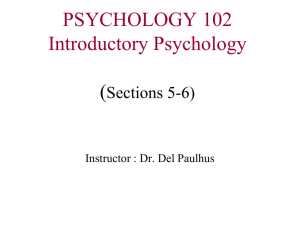

![July 31 Connect eupdate DRAFT [1]](http://s3.studylib.net/store/data/008100166_1-21bd0e395dcbfd67aaad5f18dd4ec08e-300x300.png)
